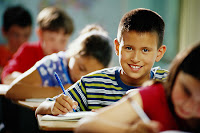Learning Your Child’s “Triggers”: Help for Destructive Behavior in Kids on the Autism Spectrum
"We are in need of some strategies to curb our son's destructive behaviors, which usually vacillates between periods of being quiet and withdrawn to periods of full out tantrumming (yelling, throwing things)."
 Destructive behavior (e.g., hitting and kicking, throwing objects, damaging property, screaming, etc.) is common in some kids with Aspergers and High-Functioning Autism (HFA). This type of behavior can be disturbing and possibly dangerous, and requires a specific parenting approach as well as additional supervision to ensure the safety of everyone involved.
Destructive behavior (e.g., hitting and kicking, throwing objects, damaging property, screaming, etc.) is common in some kids with Aspergers and High-Functioning Autism (HFA). This type of behavior can be disturbing and possibly dangerous, and requires a specific parenting approach as well as additional supervision to ensure the safety of everyone involved.
 Destructive behavior (e.g., hitting and kicking, throwing objects, damaging property, screaming, etc.) is common in some kids with Aspergers and High-Functioning Autism (HFA). This type of behavior can be disturbing and possibly dangerous, and requires a specific parenting approach as well as additional supervision to ensure the safety of everyone involved.
Destructive behavior (e.g., hitting and kicking, throwing objects, damaging property, screaming, etc.) is common in some kids with Aspergers and High-Functioning Autism (HFA). This type of behavior can be disturbing and possibly dangerous, and requires a specific parenting approach as well as additional supervision to ensure the safety of everyone involved. Since children on the spectrum do not respond well to traditional disciplinary strategies, parents must come up with an approach that doesn't accidentally reward unwanted behavior.
While the disorder is incurable, learning and development is possible with the proper treatment and education. Moms and dads should embrace early intervention opportunities whenever possible, as these can help kids develop strategies for dealing with some of the more challenging behaviors associated with Aspergers and HFA. In addition to developing coping mechanisms for destructive behavior, early intervention can help provide a greater degree of independence as these youngsters get older.
Kids on the autism spectrum generally have specific “triggers” that signal danger or disruption to their feelings of comfort and security. These young people tend to develop their own “cues” in response to these trigger events (i.e., warning signals that parents can “read” to understand that the youngster is having difficulty). These cues may include any of the following:
While the disorder is incurable, learning and development is possible with the proper treatment and education. Moms and dads should embrace early intervention opportunities whenever possible, as these can help kids develop strategies for dealing with some of the more challenging behaviors associated with Aspergers and HFA. In addition to developing coping mechanisms for destructive behavior, early intervention can help provide a greater degree of independence as these youngsters get older.
Kids on the autism spectrum generally have specific “triggers” that signal danger or disruption to their feelings of comfort and security. These young people tend to develop their own “cues” in response to these trigger events (i.e., warning signals that parents can “read” to understand that the youngster is having difficulty). These cues may include any of the following:
- becoming quiet or withdrawn
- changes in speech patterns
- complaining
- exhibiting a fear or avoidance response
- facial expressions
- feeling ill
- getting irritable
- nervous tics
- sweating
When parents anticipate these triggers or observe these cues, they should provide assurance, support and attention as quickly as possible. If parents miss these cues, kids on the spectrum may escalate their behavior to a point where they completely lose control.
==> How to Prevent Meltdowns and Tantrums in Children with Autism Spectrum Disorder
Because parents and teachers see kids in different situations, it is essential that they work together to share information about triggers and cues. This is best done on a regular basis (e.g., during the IEP meeting or a periodic review meeting) rather than in response to a crisis. However, when a crisis does occur, those who work with the youngster should meet to briefly discuss specific concerns and how to best address his/her needs in the current situation.
Tips for reducing and eliminating destructive behavior in children on the autism spectrum:
1. Aspergers and HFA kids have difficulties with social skills and self-management, and will need instruction in anger-control, tolerance of individual differences, and self-monitoring.
2. Children with the disorder interpret very literally; therefore, moms and dads need to choose their words carefully to insure their youngster will not misinterpret what they are trying to get across.
3. Consider changing your child’s diet. A gluten-free/casein-free diet is a popular diet for aggressive kids on the spectrum. Gluten is a protein found in wheat, rye, barley and some oats, and casein is a protein found in milk.
4. Eliminate sensory issues. If your youngster has sensory issues that are overwhelming, he can become aggressive. Loud noises, bright lights, lots of people, and irritating touches often cause problems for some of these young people An occupational therapist can help by doing a Sensory Profile to determine if your youngster has any sensory defensiveness.
5. Food allergies are an often overlooked cause of destructive behavior. Some children may have red ears, red cheeks, or dark circles under their eyes. These are often signs of food allergies. Some of the symptoms associated with food allergies are headaches, tantrums, feelings of nausea, difficulty concentrating, and stomach aches. As a result, the youngster is less tolerant of others and is more likely to act out. Since many of these kids also have poor communication skills, parents may not be aware that their son or daughter is not feeling well. The youngster should be tested if food allergies are suspected. If the child tests positive for certain foods, then these products should be eliminated from the diet.
6. Give your child the opportunity and space to calm down when he’s upset. If he needs to release some physical energy, find some non-destructive activities he can engage in.
7. Let your youngster know he can count in his head until the negative feeling goes away. This will help him realize that eventually the feeling does start to alleviate on its own, even if he doesn’t act on it.
8. Make sure your youngster understands that, while you understand he gets frustrated sometimes, destroying property is not acceptable – not in your home, or in the rest of the world either. Be clear in your expectations and what the consequences will be if he does destroy property.
9. Many children with the disorder can be helped to comprehend behavior they observe - but poorly understand - through the use of “social stories.” The parent’s explanation of what is happening can be reduced to a social story. A storybook can then be kept by the youngster to help reinforce the information on a concrete, basic level.
Because parents and teachers see kids in different situations, it is essential that they work together to share information about triggers and cues. This is best done on a regular basis (e.g., during the IEP meeting or a periodic review meeting) rather than in response to a crisis. However, when a crisis does occur, those who work with the youngster should meet to briefly discuss specific concerns and how to best address his/her needs in the current situation.
Tips for reducing and eliminating destructive behavior in children on the autism spectrum:
1. Aspergers and HFA kids have difficulties with social skills and self-management, and will need instruction in anger-control, tolerance of individual differences, and self-monitoring.
2. Children with the disorder interpret very literally; therefore, moms and dads need to choose their words carefully to insure their youngster will not misinterpret what they are trying to get across.
3. Consider changing your child’s diet. A gluten-free/casein-free diet is a popular diet for aggressive kids on the spectrum. Gluten is a protein found in wheat, rye, barley and some oats, and casein is a protein found in milk.
4. Eliminate sensory issues. If your youngster has sensory issues that are overwhelming, he can become aggressive. Loud noises, bright lights, lots of people, and irritating touches often cause problems for some of these young people An occupational therapist can help by doing a Sensory Profile to determine if your youngster has any sensory defensiveness.
5. Food allergies are an often overlooked cause of destructive behavior. Some children may have red ears, red cheeks, or dark circles under their eyes. These are often signs of food allergies. Some of the symptoms associated with food allergies are headaches, tantrums, feelings of nausea, difficulty concentrating, and stomach aches. As a result, the youngster is less tolerant of others and is more likely to act out. Since many of these kids also have poor communication skills, parents may not be aware that their son or daughter is not feeling well. The youngster should be tested if food allergies are suspected. If the child tests positive for certain foods, then these products should be eliminated from the diet.
6. Give your child the opportunity and space to calm down when he’s upset. If he needs to release some physical energy, find some non-destructive activities he can engage in.
7. Let your youngster know he can count in his head until the negative feeling goes away. This will help him realize that eventually the feeling does start to alleviate on its own, even if he doesn’t act on it.
8. Make sure your youngster understands that, while you understand he gets frustrated sometimes, destroying property is not acceptable – not in your home, or in the rest of the world either. Be clear in your expectations and what the consequences will be if he does destroy property.
9. Many children with the disorder can be helped to comprehend behavior they observe - but poorly understand - through the use of “social stories.” The parent’s explanation of what is happening can be reduced to a social story. A storybook can then be kept by the youngster to help reinforce the information on a concrete, basic level.
==> Parenting System that Reduces Defiant Behavior in Teens with Autism Spectrum Disorder
10. Many parents are giving their autistic kids safe nutritional supplements, such as Vitamin B6 with magnesium and Di-methyl-glycine (DMG). Nearly half have reported a reduction in behavioral problems as well as improvements in their youngster’s general well-being.
11. Moms and dads often feel furious when their youngster damages or destroys property. This is understandable. Property destruction is a personal violation, and it hurts to have a son or daughter treat something that you’ve worked hard for with such little respect. But, once you make up my mind that you will hold your child accountable for anything he purposely destroys, making sure he pays for things by controlling the money you usually chose to spend on him, you won’t feel as angry. You will be able to respond more calmly, because you know he will be held accountable. And once he learns that he pays for the damages, it may only take a few times for him to choose to handle things differently.
12. Often times, a behavior problem is a reaction to a request or demand made by parents. The child may have learned that he can escape or avoid such situations (e.g., doing chores or homework) by acting out. A functional assessment of the child’s behavior (i.e., antecedents, consequences, context of the behavior) may reveal certain relationships between the behavior and the function the behavior serves. If avoidance is the function the behavior serves, parents should follow through with all requests and demands they make to the child. If the child is able to escape or avoid such situations, even only some of the time, the behavior problem will likely continue.
13. Remember that any change in routine may result in emotional or behavioral upset. If the youngster’s environment must be changed (e.g., the absence of a parent), try to maintain as much of the normal routine as possible (e.g., meals, play, bedtime) in the new environment. In addition, try to bring concrete elements from the youngster’s more routine environment (e.g., a toy, blanket, game, etc.) into the new environment to maintain some degree of “sameness” or constancy.
14. Some kids break their own things when they’re upset or angry. If your youngster gets angry, throws his iPad and it breaks, the natural consequence is that he no longer has an iPad. Don’t buy him a new one!
15. Talk with your youngster during a calm moment about things he can do instead of breaking things when he gets upset.
16. Teach your youngster to use journaling, music, drawing, clay, or any other non-destructive activity he might be interested in to release feelings.
17. Try behavior intervention. Behavior specialists work with kids who have difficult and aggressive behaviors. They observe them in their environments to determine the underlying cause of the behaviors.
18. Your job as a mother or father is to prepare your youngster for the “real world.” In the real world, if you destroy property, there are consequences (e.g., financial, legal, etc.). You want to respond to your youngster’s destructive behavior in a way that leaves no doubt about what he will experience should he engage in this behavior outside your home.
19. It is important to consider the child’s level of arousal when formulating a strategy to treat behavioral problems:
10. Many parents are giving their autistic kids safe nutritional supplements, such as Vitamin B6 with magnesium and Di-methyl-glycine (DMG). Nearly half have reported a reduction in behavioral problems as well as improvements in their youngster’s general well-being.
11. Moms and dads often feel furious when their youngster damages or destroys property. This is understandable. Property destruction is a personal violation, and it hurts to have a son or daughter treat something that you’ve worked hard for with such little respect. But, once you make up my mind that you will hold your child accountable for anything he purposely destroys, making sure he pays for things by controlling the money you usually chose to spend on him, you won’t feel as angry. You will be able to respond more calmly, because you know he will be held accountable. And once he learns that he pays for the damages, it may only take a few times for him to choose to handle things differently.
12. Often times, a behavior problem is a reaction to a request or demand made by parents. The child may have learned that he can escape or avoid such situations (e.g., doing chores or homework) by acting out. A functional assessment of the child’s behavior (i.e., antecedents, consequences, context of the behavior) may reveal certain relationships between the behavior and the function the behavior serves. If avoidance is the function the behavior serves, parents should follow through with all requests and demands they make to the child. If the child is able to escape or avoid such situations, even only some of the time, the behavior problem will likely continue.
13. Remember that any change in routine may result in emotional or behavioral upset. If the youngster’s environment must be changed (e.g., the absence of a parent), try to maintain as much of the normal routine as possible (e.g., meals, play, bedtime) in the new environment. In addition, try to bring concrete elements from the youngster’s more routine environment (e.g., a toy, blanket, game, etc.) into the new environment to maintain some degree of “sameness” or constancy.
14. Some kids break their own things when they’re upset or angry. If your youngster gets angry, throws his iPad and it breaks, the natural consequence is that he no longer has an iPad. Don’t buy him a new one!
15. Talk with your youngster during a calm moment about things he can do instead of breaking things when he gets upset.
16. Teach your youngster to use journaling, music, drawing, clay, or any other non-destructive activity he might be interested in to release feelings.
17. Try behavior intervention. Behavior specialists work with kids who have difficult and aggressive behaviors. They observe them in their environments to determine the underlying cause of the behaviors.
18. Your job as a mother or father is to prepare your youngster for the “real world.” In the real world, if you destroy property, there are consequences (e.g., financial, legal, etc.). You want to respond to your youngster’s destructive behavior in a way that leaves no doubt about what he will experience should he engage in this behavior outside your home.
19. It is important to consider the child’s level of arousal when formulating a strategy to treat behavioral problems:
- Over-arousal. Sometimes behavioral problems occur when the child is overly-excited. This can occur when the child is anxious and/or when there is too much stimulation in the environment. In these cases, treatment should be aimed at calming the child.
- Under-arousal. Behavioral problems may be due to a low level of arousal, such as when the child is passive or bored. Behaviors such as aggression and destructiveness may be exciting, and thus appealing to some of these kids. If parents suspect behavior problems are due to under-arousal, the child should be kept busy or active.
20. If all else fails, it may be necessary to try medication to reduce destructive behavior. Discuss medication with your youngster’s doctor, neurologist or behavior specialist. Determine as a team the best approach to treating him with the proper medication. Keep in mind that medication is not necessarily permanent, and if it doesn't work, just stop it.
Resources for parents of children and teens on the autism spectrum:
==> How to Prevent Meltdowns and Tantrums in Children with Autism Spectrum Disorder
==> Parenting System that Reduces Defiant Behavior in Teens with Autism Spectrum Disorder
==> Launching Adult Children with Autism Spectrum Disorder: Guide for Parents Who Want to Promote Self-Reliance
==> Teaching Social-Skills and Emotion-Management to Children with Autism Spectrum Disorder
==> Parenting Children and Teens with High-Functioning Autism: Parents' Comprehensive Handbook
==> Unraveling the Mystery Behind High-Functioning Autism: Audio Book
==> Crucial Research-Based Parenting Strategies for Children and Teens with High-Functioning Autism
==> Parenting System that Reduces Defiant Behavior in Teens with Autism Spectrum Disorder
==> Launching Adult Children with Autism Spectrum Disorder: Guide for Parents Who Want to Promote Self-Reliance
==> Teaching Social-Skills and Emotion-Management to Children with Autism Spectrum Disorder
==> Parenting Children and Teens with High-Functioning Autism: Parents' Comprehensive Handbook
==> Unraveling the Mystery Behind High-Functioning Autism: Audio Book
==> Crucial Research-Based Parenting Strategies for Children and Teens with High-Functioning Autism
COMMENTS:
• Anonymous said... After many years and many different approaches, my 16 year old son with aspergers is finally learning to use words instead of fists! It isn't always perfect, but it is so much better.
• Anonymous said... And DMG if others have had success. Son take 3meds but would like to think there is hope he could ween off prescription meds and with the therapy he is receiving g and maturation.....he could get by with less Rx' s.
• Anonymous said... Curious...why the B6? Has anyone tried that, with positive results?
• Anonymous said... Ditto everything Ms Musgrave said. Our 17 yr old was diagnosed at age 13-14, and now seems to be on a better path after yrs of anxiety and stress on both him and I. Would also be curious about the B6 and
• Anonymous said... I have tried B6 with my son and it gave my son horrible nightmares to the point he would keep himself awake. I researched the vitamin to find out that it is actually a normal reaction. Everyone is different, I know this, but I want to give a heads up to anyone wanting to try it.
• Anonymous said... It is so true about the disciplinary actions that parents try to enforce. They often work on other siblings, but when it comes to an Asperger child you are pretty much at a loss. Some people often say, well have you done this or try this. I know they think they are trying to help, but unless you have an Asperger child, you have no idea what parents go through every single day. School is a another story...most teachers don't know what to do with an Aspergers child, some have never heard of Aspergers Syndrome. So we battle with the education portion of trying to teach teachers about Aspergers and how Aspergers children respond and act about different things and also dealing with other students that have no idea what's going on. We have three very special boys, one is just extra special. Just a day in the Musgrave life...just keep praying.
• Anonymous said... So important
• Anonymous said... Will has ADHD and is doing so much better now. Much more comfortable in himself. That is a big adjustment too.
Post your comment below…
• Anonymous said... After many years and many different approaches, my 16 year old son with aspergers is finally learning to use words instead of fists! It isn't always perfect, but it is so much better.
• Anonymous said... And DMG if others have had success. Son take 3meds but would like to think there is hope he could ween off prescription meds and with the therapy he is receiving g and maturation.....he could get by with less Rx' s.
• Anonymous said... Curious...why the B6? Has anyone tried that, with positive results?
• Anonymous said... Ditto everything Ms Musgrave said. Our 17 yr old was diagnosed at age 13-14, and now seems to be on a better path after yrs of anxiety and stress on both him and I. Would also be curious about the B6 and
• Anonymous said... I have tried B6 with my son and it gave my son horrible nightmares to the point he would keep himself awake. I researched the vitamin to find out that it is actually a normal reaction. Everyone is different, I know this, but I want to give a heads up to anyone wanting to try it.
• Anonymous said... It is so true about the disciplinary actions that parents try to enforce. They often work on other siblings, but when it comes to an Asperger child you are pretty much at a loss. Some people often say, well have you done this or try this. I know they think they are trying to help, but unless you have an Asperger child, you have no idea what parents go through every single day. School is a another story...most teachers don't know what to do with an Aspergers child, some have never heard of Aspergers Syndrome. So we battle with the education portion of trying to teach teachers about Aspergers and how Aspergers children respond and act about different things and also dealing with other students that have no idea what's going on. We have three very special boys, one is just extra special. Just a day in the Musgrave life...just keep praying.
• Anonymous said... So important
• Anonymous said... Will has ADHD and is doing so much better now. Much more comfortable in himself. That is a big adjustment too.
Post your comment below…


